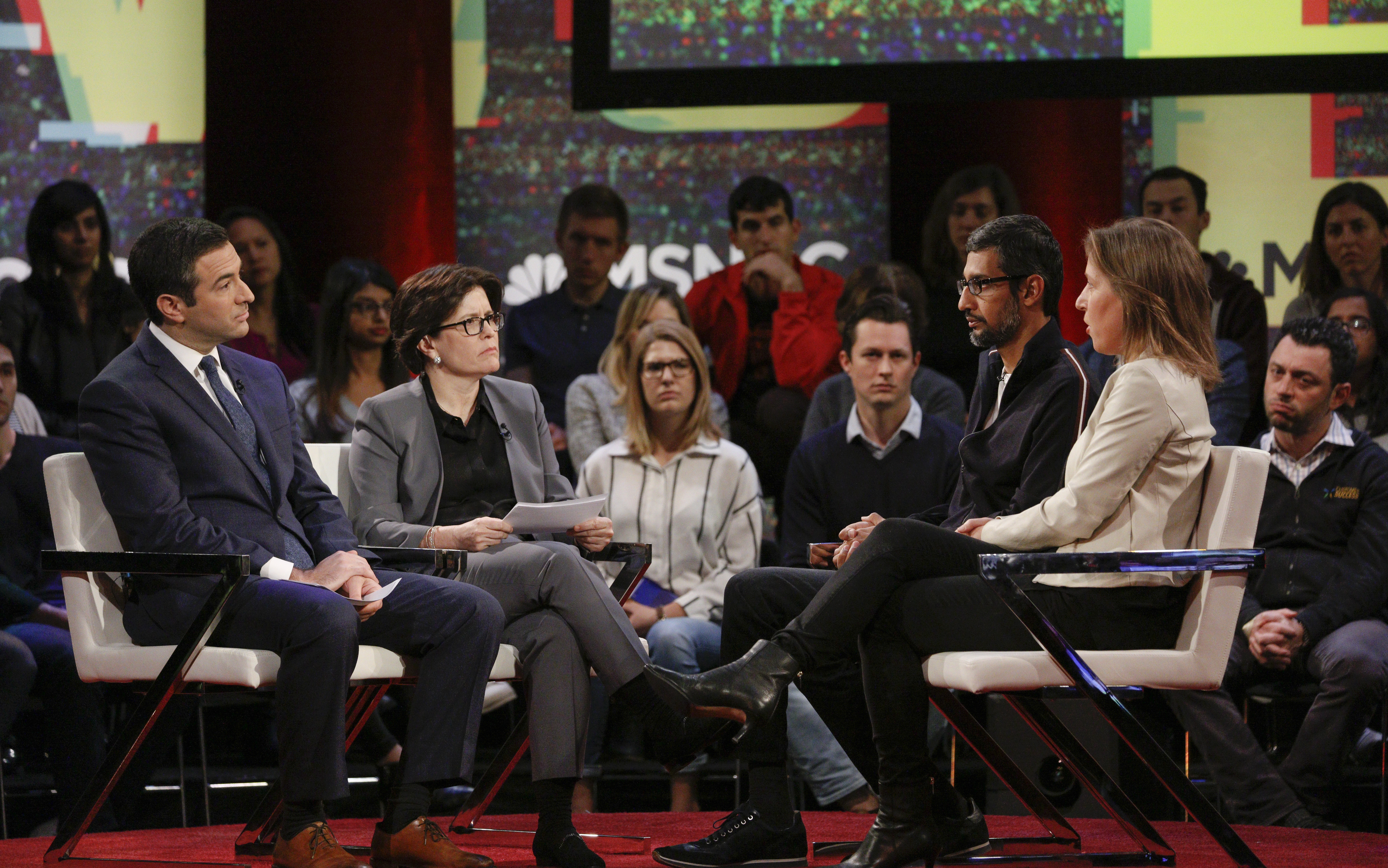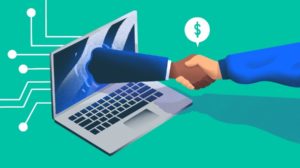From immigration and DACA policies to diversity in tech, artificial intelligence, and election interference, 2017 could be overwhelming.
Where did we take out that emotion? Online. And as our engagement in politics and society has moved from face-to-face interactions to threads under posts, the stakes for Silicon Valley tech companies have risen.
On Friday, Crunchbase News attended the Town Hall Event With Google and Youtube hosted by MSNBC and Recode. At the event, Google CEO, Sundar Pichai, and Youtube CEO, Susan Wojcicki, spoke about how they are addressing some of these issues. The following is a rundown of what mattered most from the event.
In August, Pichai, along with executives from other high-profile tech companies, signed an open letter to President Trump and congressional leaders urging them to continue the DACA program. On Friday, he stressed the importance of the topic.
“We literally had people who were deeply affected by this, which is why we speak out on behalf of our employees,” Pichai told town hall attendees.
In speaking about the H-1B visa program, which grants visas to highly skilled foreign workers sponsored by U.S. companies, Susan Wojcicki, daughter of a Polish immigrant herself, expressed that the immigration issue is not just one of importance from a humanitarian standpoint.
“I think we’re seeing the H-1B visa as being really, really important to our company in terms of the competitiveness,” she explained. She expressed that it is, at least in in part, up to tech companies to make the case that immigration is good for the country, noting that skilled workers can opt to look elsewhere for work.
Still, though, the two believe that tech companies are not the only ones responsible for this issue, saying that the problem will only be solved when all sides come together. They explained that politics makes this issue more nuanced, and, especially in the case of Youtube, they believe that it is important not to politicize their support given the range of viewpoints of the users that they serve.
The CEOs also tried to calm our fears about the potential consequences of artificial intelligence (AI), responding to questions about the potential for AI to lead to unemployment, particularly in the manufacturing industry in the U.S. and abroad. The executives defended its value while also positing that advancement in AI may be cause for a shift in our conception of work itself.
“I do believe over time the nature of work [will] change,” Sundar Pichai explained. He went on to say that the nature of education will change as work itself changes. “For the generation being born now. They will have to learn continuously over their lives.”
Wojcicki explained that if automation has the potential to displace jobs, as it has in the past, new jobs will rise.
But AI isn’t the only development for which many believe tech companies should be held responsible. The 2017 presidential election year was plagued with accusations of malicious foreign interference through circulated social media content, leading many to ask: Do tech companies have a responsibility to filter content?
Both Wojcicki and Pichai said the key to answering questions regarding content removal is being able to draw the line between freedom of speech and content removal.
In light of controversies surrounding Youtube content, including the Logan Paul situation, people have criticized Youtube saying that it is not doing a good enough job of filtering content. Wojcicki responded to this criticism saying that Youtube’s machines remove 98% of violent extremism content uploaded to Youtube, with half of that being removed within two hours. Remaining videos are then vetted by trained individuals. She also added that in December, following complaints regarding video review, Youtube hired 10,000 more individuals to review controversial content.
“We need a lot more experts, because there are a lot of nuances,” she said. “We need to go to the experts to get their feedback of what content [we should be] working [and] taking down, and [about how to] redraw our policies to be able to do the right thing,” she explained, adding that the close attention that the media and users pay to Youtube’s policies and mistakes keeps it accountable.
New policies, such as tagging state-funded news sources, will, according to Wojcicki, better inform users about where content is coming from.
So where does Google and Youtube stand in promoting and protecting women in tech? One thing that the audience, the hosts, and the guests agreed on: representation matters. The two tech CEOs agreed that there is a realization of what has gone wrong in the industry. When asked why they think women are not involved in tech, Susan Wojcicki responded that “computer science as a whole has a reputation of being a very geeky male industry.”
When asked whether or not they regretted firing James Demore, both said that they did not regret firing him because they promote inclusive, diverse environments; however, they wish it hadn’t been so politicized.
“We also need to make sure that our employees are staying within our code of conduct,” Wojcicki explained.
When pressed further, the CEOs responded to a question about whether or not women at Google should be released from non-disclosure agreements that prevent them from speaking out about their experiences.
“I have no issues with that. I mean, I don’t think we particularly do non-disclosure agreements around these types of issues” Sundar Pichai explained.
The event closed leaving Crunchbase News a bit more hopeful that Google is attempting to increase the respect and representation of people of color and women in its company and tech more broadly. Inclusion has the potential to connect users to more representative, valuable, and open-minded content. Increased diversity in this influential body can allow more individuals from the U.S. and around the world to pursue opportunities in fields where they have been left out, and it may encourage other companies in tech and adjacent industries to embrace the values of diversity.
You can watch the full interview, “Revolution: Google and YouTube Changing the World,” by tuning in to MSNBC on January 26th at 10 pm ET / 7 pm PT.
Photo Credit: Kim White/MSNBC

Stay up to date with recent funding rounds, acquisitions, and more with the Crunchbase Daily.



![Illustration of 50+ woman on smartphone. [Dom Guzman]](https://news.crunchbase.com/wp-content/uploads/2021/01/Femtech_-300x168.jpg)


67.1K Followers